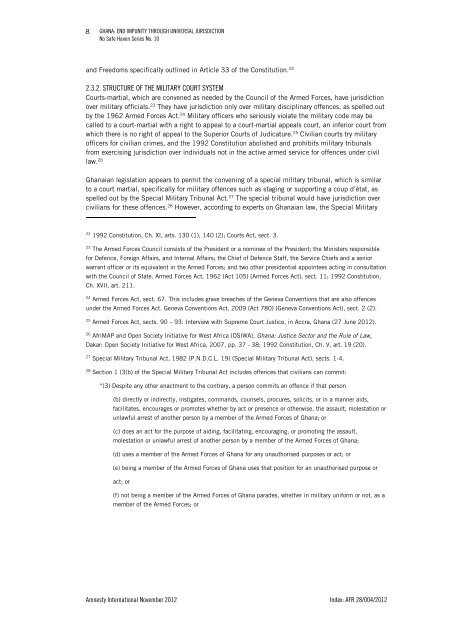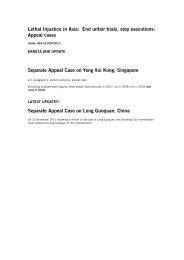Ghana - Amnesty International
Ghana - Amnesty International
Ghana - Amnesty International
You also want an ePaper? Increase the reach of your titles
YUMPU automatically turns print PDFs into web optimized ePapers that Google loves.
8GHANA: END IMPUNITY THROUGH UNIVERSAL JURISDICTIONNo Safe Haven Series No. 10and Freedoms specifically outlined in Article 33 of the Constitution. 222.3.2. STRUCTURE OF THE MILITARY COURT SYSTEMCourts-martial, which are convened as needed by the Council of the Armed Forces, have jurisdictionover military officials. 23 They have jurisdiction only over military disciplinary offences, as spelled outby the 1962 Armed Forces Act. 24 Military officers who seriously violate the military code may becalled to a court-martial with a right to appeal to a court-martial appeals court, an inferior court fromwhich there is no right of appeal to the Superior Courts of Judicature. 25 Civilian courts try militaryofficers for civilian crimes, and the 1992 Constitution abolished and prohibits military tribunalsfrom exercising jurisdiction over individuals not in the active armed service for offences under civillaw. 26<strong>Ghana</strong>ian legislation appears to permit the convening of a special military tribunal, which is similarto a court martial, specifically for military offences such as staging or supporting a coup d’état, asspelled out by the Special Military Tribunal Act. 27 The special tribunal would have jurisdiction overcivilians for these offences. 28 However, according to experts on <strong>Ghana</strong>ian law, the Special Military221992 Constitution, Ch. XI, arts. 130 (1), 140 (2); Courts Act, sect. 3.23The Armed Forces Council consists of the President or a nominee of the President; the Ministers responsiblefor Defence, Foreign Affairs, and Internal Affairs; the Chief of Defence Staff, the Service Chiefs and a seniorwarrant officer or its equivalent in the Armed Forces; and two other presidential appointees acting in consultationwith the Council of State. Armed Forces Act, 1962 (Act 105) (Armed Forces Act), sect. 11; 1992 Constitution,Ch. XVII, art. 211.24Armed Forces Act, sect. 67. This includes grave breaches of the Geneva Conventions that are also offencesunder the Armed Forces Act. Geneva Conventions Act, 2009 (Act 780) (Geneva Conventions Act), sect. 2 (2).25Armed Forces Act, sects. 90 – 93: Interview with Supreme Court Justice, in Accra, <strong>Ghana</strong> (27 June 2012).26AfriMAP and Open Society Initiative for West Africa (OSIWA), <strong>Ghana</strong>: Justice Sector and the Rule of Law,Dakar: Open Society Initiative for West Africa, 2007, pp. 37 - 38; 1992 Constitution, Ch. V, art. 19 (20).27Special Military Tribunal Act, 1982 (P.N.D.C.L. 19) (Special Military Tribunal Act), sects. 1-4.28Section 1 (3(b) of the Special Military Tribunal Act includes offences that civilians can commit:“(3) Despite any other enactment to the contrary, a person commits an offence if that person(b) directly or indirectly, instigates, commands, counsels, procures, solicits, or in a manner aids,facilitates, encourages or promotes whether by act or presence or otherwise, the assault, molestation orunlawful arrest of another person by a member of the Armed Forces of <strong>Ghana</strong>; or(c) does an act for the purpose of aiding, facilitating, encouraging, or promoting the assault,molestation or unlawful arrest of another person by a member of the Armed Forces of <strong>Ghana</strong>;(d) uses a member of the Armed Forces of <strong>Ghana</strong> for any unauthorised purposes or act; or(e) being a member of the Armed Forces of <strong>Ghana</strong> uses that position for an unauthorised purpose oract; or(f) not being a member of the Armed Forces of <strong>Ghana</strong> parades, whether in military uniform or not, as amember of the Armed Forces; or<strong>Amnesty</strong> <strong>International</strong> November 2012 Index: AFR 28/004/2012
















